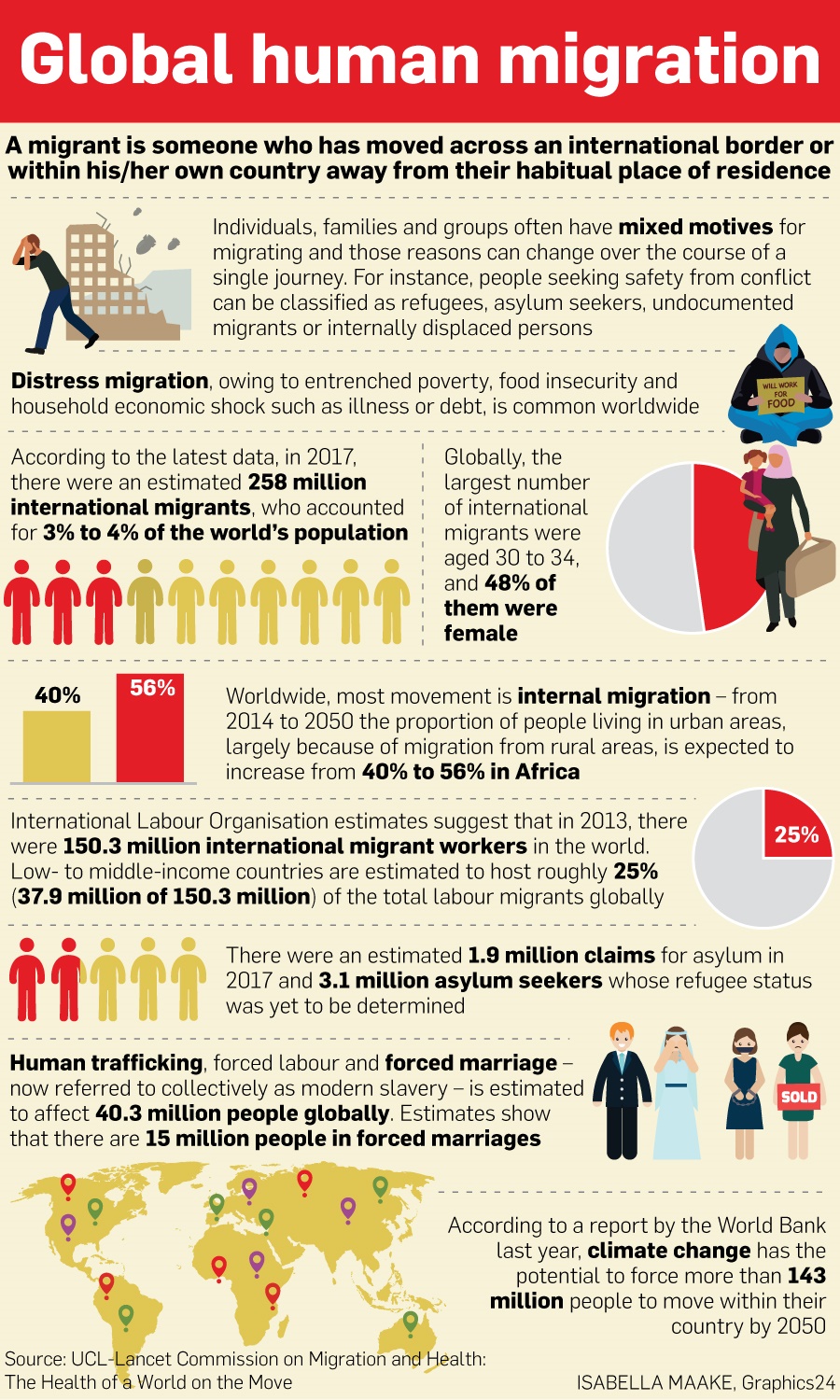UCL-Lancet Commission says contrary to popular belief, immigrants are not a huge burden on healthcare
They’re blamed for stealing jobs and for the high levels of crime in some communities.
They are also accused of spreading sex work and drug dealing.
And when it comes to their healthcare needs, the blame game is heavily shifted towards immigrants, mostly referred to as foreigners.
Populist rhetoric often crucifies immigrants living in the country, whether they are here legally or illegally.
They are accused of overcrowding maternity wards, in particular, and of adding to the woes of the already overwhelmed public health sector.
But a new report titled The UCL-Lancet Commission on Migration and Health: the health of a world on the move, whose Southern African launch was in Johannesburg this month, interrogates and dispels some commonly held “myths” and “inaccurate stereotypes” related to immigrants and their access to the healthcare system.
The report also delves into internal migration – a rarely probed aspect when it comes to its effect on the health system of the cities gaining new residents.
Just last week shops owned by foreign nationals were looted in parts of Soweto in allegedly xenophobic attacks.
Earlier this month, violent clashes broke out between foreigners and the police in the Johannesburg CBD during raids to seize counterfeit goods.
More than 600 foreigners were arrested and 487 of them were found to be undocumented immigrants.
The local release of the report was also particularly timely as last week the latest iteration of the National Health Insurance (NHI) Bill was introduced in Parliament.
It revealed government’s plan towards immigrants accessing healthcare – stating that permanent residents, refugees and “designated foreign nationals” would also benefit from NHI.
Asylum seekers and illegal immigrants would only be entitled to emergency medical services and services for notifiable conditions of public health concern, such as HIV or tuberculosis.
Their children however, would be entitled to basic healthcare services.
In challenging the commonly held narratives around immigrants, the Lancet report disputes several claims such as immigrants being a burden on host country or city services; fertility rates among them being higher than host populations; them damaging economies; and also some of them being disease carriers who pose risks to resident populations.
Late last year, former health minister Aaron Motsoaledi controversially claimed that foreign nationals were overcrowding the local health system.
Speaking at the National Education, Health and Allied Workers’ Union’s (Nehawu’s) nurses’ summit in November, he was quoted as saying: “The weight that foreign nationals are bringing to the country has got nothing to do with xenophobia … it’s a reality. Our hospitals are full, we can’t control them. When a woman is pregnant and about to deliver a baby you can’t turn her away from the hospital and say you are a foreign national … you can’t.”
He continued: “And when they deliver a premature baby, you have got to keep them in hospital.
“When more and more come, you can’t say the hospital is full now go away … they have to be admitted, we have got no option – and when they get admitted in large numbers, they cause overcrowding, infection control starts failing,” Motsoaledi said.
But according to evidence in this latest report, research showed that immigrants have lower first-birth rates than locals.
“Moreover, birth rates among migrants were barely at the level of population replacement and often falling. Access to contraception also influences differences in fertility rates.
“Poor access to contraception among migrants is often related to inconsistent policies, guidelines and provision of services,” the report noted.
However, the report does state that evidence about fertility and its association with internal migration in lower-to-middle income countries (South Africa being a middle-income country) was scarce.
On the claim that immigrants damage local economies by receiving more social assistance than what they contribute in taxes, the researchers stated: “In advanced economies, each 1% increase of migrants in the adult population increases the GDP per person by up to 2%.”
In terms of immigrants being carriers of disease, the report is emphatic: “Suspicion against migrants as carriers of disease is probably the most pervasive and powerful myth related to migration and health throughout history.
“Although historical examples exist of the introduction of diseases into new settings through human mobility – that is the spread of infection from European colonial settlers – the risk of transmission from migrating populations to host populations is generally low,” it added.
The report aims to be a call to action for civil society, health leaders, academics and policy makers to maximise the benefits and reduce costs of migration on health locally and globally.
It also proposes that racism and prejudice be confronted with a “zero tolerance approach” to oppose xenophobia that fuels the exclusion of immigrant populations.
The commission strongly advocates that migration be treated urgently as a core determinant of health and well-being and that it be addressed as a global health priority of the 21st century.
“In the South African context, we have a massive gap in understanding internal migration … There are profound data gaps in an area where opinion, perception, and political advantage tend to take precedence,” said Professor Steve Tollman, one of the co-authors of the report and associate professor at the Wits School of Public Health.
“Through the Lancet process, we seek to bring data and evidence to bear, to both counter prevailing myths and highlight the need to strengthen our understanding – which, in the South African and regional arena, relates directly to internal, often labour, migrants,” Tollman said.
TALK TO US
Do you think this report will do enough to dispel myths and end inaccurate stereotypes about the impact of foreigners on the national healthcare?
SMS us on 35697 using the keyword FOREIGNERS and tell us what you think. Please include your name and province. SMSes cost R1.50. By participating, you agree to receive occasional marketing material
 |
| ||||||||||||
| |||||||||||||




 Publications
Publications
 Partners
Partners










